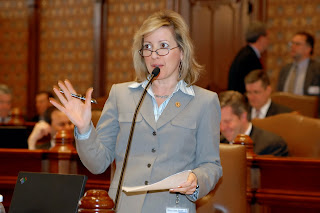Rockford Amtrak Progressing
 The Union Pacific freight train that was roaring through Marengo with horns blasting a little after noon Saturday was not a precursor of Amtrak service to McHenry County.
The Union Pacific freight train that was roaring through Marengo with horns blasting a little after noon Saturday was not a precursor of Amtrak service to McHenry County.
That was made abundantly clear at a Rockford College presentation Saturday morning.
The once-a-day round trip Amtrak engines and coaches are on the track from Chicago to Rockford and Dubuque though.
They’re picking up speed, but not through McHenry County. There was a clue late last week when U.S. Senator Dick Durbin’s press release announcing Saturday’s meeting did not even mention McHenry County.
There was a clue late last week when U.S. Senator Dick Durbin’s press release announcing Saturday’s meeting did not even mention McHenry County.
McHenry County officials from Huntley and Marengo attended anyway.
Under the aegis of Durbin and Congressman Don Manzullo, Amtrak officials presented the results of a study stimulated by a meeting last July.  There were three alternative routes, but the old Blackhawk route to Dubuque is the one that is so, so most likely to be selected.
There were three alternative routes, but the old Blackhawk route to Dubuque is the one that is so, so most likely to be selected.
Its major problem is “some congestion issues around Chicago,” where there is a need for “additional capacity.” The cost would be about $23 million for what the Amtrak chart calls the “direct route” with estimated annual ridership of 113,300 passengers.
The “Belvidere” route, which would go through Huntley and Marengo, has “no connection between Metra and Union Pacific in Elgin” and would need “a connector in Rockford.” The cost would be $32 million and the number of passengers 62,200. Part of the route through the Rockford Airport is so bad that it would require “a complete rebuilding” and the “East is quite poor,” Franke said. The cost would be $55-62 million with 51,200.
Part of the route through the Rockford Airport is so bad that it would require “a complete rebuilding” and the “East is quite poor,” Franke said. The cost would be $55-62 million with 51,200.
The old Blackhawk route is the cheapest and Durbin, Manzullo and Acting Illinois Department of Transportation Director Milt Sees want action now. A cursory glance shows construction cost of $200 per annual passenger, while the Belvidere route is in the neighborhood of $513 and the airport route $1,100-1,200.
On capital cost, then, there is no question that the “direct route” is cheapest.
It wins on annual operating cost, too. The Belvidere route is 1.2 times as expensive, while the airport route is 1.24 times higher.
In absolute dollars of annual subsidy, however, the difference between the three is only $600,000. The congress folks and IDOT want action so “now” that the public hearing will be on Monday, April 16th!
The congress folks and IDOT want action so “now” that the public hearing will be on Monday, April 16th!
That’s two weeks from now.
And, disagreement is likely to kill the possibilities.
As Sees put it,
I, too, have been in this racket for a long time. The only way for people to get their projects is to agree.Sees said, indicating the two congressmen.
Anytime you get into a protracted debate, you lose time and time increases money.
The window of opportunity can close on you very rapidly.
You have to help them help you,
 Rockford Mayor Larry Morrisey, whose city wins regardless of which route is selected, said, “We don’t want to be fighting against ourselves.
Rockford Mayor Larry Morrisey, whose city wins regardless of which route is selected, said, “We don’t want to be fighting against ourselves.  We look forward to rail coming to our communities.”
We look forward to rail coming to our communities.”After Amtrak’s Mike Franke indicated service could be started as soon as two years from now, assuming negotiations with the railroad go well, Drubin said, “I’d sure hate to waste this construction season.”
Durbin called for “a spirit of cooperation,” for "not letting the best become the enemy of the good."
Other problems include the need for train stations.
 “It’s going to be up to the locals to build the stations,” Franke said. “Five or six stations make sense.”
“It’s going to be up to the locals to build the stations,” Franke said. “Five or six stations make sense.”“Don’t come to us for earmarks for stations,” Manzullo warned.
There would be “no food service” and “the supply of Amtrak rolling stock is extremely tight.”
If Amtrak is to supply them, they will “have to be taken out of storage and rehabbed.”
Only one ordinary citizen was allowed to speak.
 Janet Fisher, describing herself as “The Crazy Train Lady,” said, “I’m just thrilled with all of this. If we get something in place, it will blossom and grow.”
Janet Fisher, describing herself as “The Crazy Train Lady,” said, “I’m just thrilled with all of this. If we get something in place, it will blossom and grow.”Manzullo wanted to know if the train could be used for commuting from Rockford to Chicago. He was told that the trip would take an hour and 45 minutes, leaving Rockford early enough for commuters and leaving Chicago at 6:15 in the evening for the return trip.
Manzullo made a point of stating,
There is not one passenger train that operates (without a subsidy).
 Two of the people allowed to speak were state representatives.
Two of the people allowed to speak were state representatives.Republican State Representative Dave Winters asked whether this effort could be part of the effort to extend Amtrak service to Minneapolis.
He got a “No” for an answer.
At one point, when Durbin was pointing out that it would take state legislation to change the "footprint" of Metra, Winters indicated that "very informal" talks were taking place that would apparently give the Rockford Airport Authority the power to deal with trains.
It is my impression that the Rockford Airport Authority has significant non-referendum bonding authority. Maybe local influentials intend to use that power to get money to pay for local Amtrak track repairs.

 Rockford Democratic Party State Rep. Chuck Jefferson was the final speaker. He was effusive in his praise of Durbin.
Rockford Democratic Party State Rep. Chuck Jefferson was the final speaker. He was effusive in his praise of Durbin. Also introduced was Boone County’s Republican State Rep. Ron Wait.
Attending from McHenry County were Huntley Village President Chuck Sass and Village Manager Carl Tomaso, plus Marengo Mayor Don Lockhart and City Administrator Scott Hartman.
None got an opportunity to speak at the forum.
= = = = =
 The Union Pacific train was on the track speeding through Marengo right after noon.
The Union Pacific train was on the track speeding through Marengo right after noon.Next can be seen the three routes being considered and the table showing the cost figures for each route.
Acting IDOT Secretary Milt Sees is below on the right.
 Rockford Mayor Larry Morrisey is down to the left with Senator Dick Durbin's picture to his right.
Rockford Mayor Larry Morrisey is down to the left with Senator Dick Durbin's picture to his right.Underneath is a photography of Congressman Don Manzullo.
Below her is "Crazy Train Lady" Janet Fisher.
The three state legislators attending come next. On top, at the left, is Dave Winters. Below him is Chuck Jefferson. To Jefferson's right is Ron Wait.
 Beneath the photo credit line are pictures of Huntley Village President Chuck Sass and his Village Manager Carl Tomaso leaving the meeting.
Beneath the photo credit line are pictures of Huntley Village President Chuck Sass and his Village Manager Carl Tomaso leaving the meeting.Next is a "before meeting" shot of Belvidere Mayor Fred Brereton and Marengo Mayor Don Lockhart. Brereton got to speak, as did Boone County Board Vice Chairman David Taylor and Winnebago County Board Chairman Scott Christiansen. Christiansen is seen to the left.
There is, of course, much more on McHenry County Blog this weekend. Read more...















